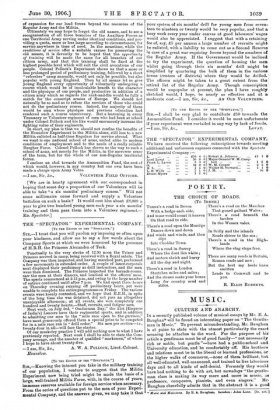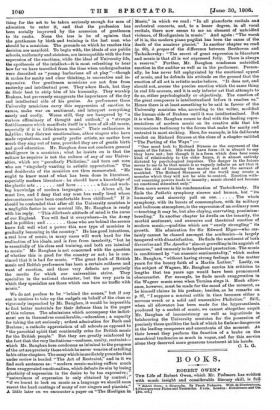MUSIC • CULTURE AND ANARCHY.
IN a recently published volume of musical essays by Mr. E. A. Baughan* will be found an interesting paper on " The Gentle- man in Music." To prevent misunderstanding, Mr. Baughan is at pains to state with the utmost particularity the exact meaning he attaches to the word. For the purpose of his article a gentleman must be of good family—" not necessarily rich or noble, but gentle "—have had a public-school and University education, and be comfortably off. His brothers and relations must be in the liberal or learned professions, or the higher walks of commerce,—none of them brilliant, but all well-educated, well-mannered, and trained to live laborious days and to all kinds of self-denial. Formerly they would have had nothing to do with art, but nowadays " the gentle- man class is making its way more and more in music, as professors, composers, pianists, and even singers." Mr. Baughan cheerfully admits that in the abstract it is a good * Music and Musicians. By E. A. Baughaa. London : John Lane. De. net].
thing for the art to be taken seriously enough for men of education to enter it, and that the profession has
been socially improved by the accession of gentlemen
to its ranks. None the less is he of opinion that the gentleman by birth and training is the last man who should be a musician. The grounds on which he reaches this decision are manifold. To begin with, the ideals of our public schools, uniformity and stoicism, are incompatible with the free expression of the emotions, while the ideal of University life, the apotheosis of the intellect—it is most refreshing to hear Low far we have travelled from the time when undergraduates were described •as "young barbarians all at play "—though it makes for sanity and clear thinking, is uncreative and in- expansive. Our gentlemen musicians are not free from austerity and intellectual pose. They adore Bach, but they do their best to strip him of his humanity. They worship Brahms, but perversely exaggerate the importance of the dry and intellectual side of his genius. As performers these University musicians carry this suppression of emotion to exoess, make war on sentiment, and interpret everything sanely and coolly. Worse still, they are hampered by "a curious effeminacy of thought and outlook," a " strange fastidiousness which manifests itself in a love of all old music, especially if it is little-known music." Their enthusiasm is ladylike: they distrust emotionalism, abhor singers who have made reputations, and greatly prefer artists, no matter how much they sing out of tune, provided they are of gentle birth and good education. Mr. Baughan does not condemn general intelligence in a musician ; what he insists on is that the culture he requires is not the culture of any of our Univer- sities, which are "peculiarly Philistine," and turn out men Rho are " singularly wanting in artistic appreciation." The real desiderata of the musician are then enumerated. "He ought to know most of what has been done in literature, especially modern literature : he should have a knowledge of the plastic arts and have a fair and work- ing knowledge of modern languages Above all, he must live, and .I deny that any man has really lived whose circumstances have been comfortable from childhood." If it should be contended that after all the University musician is a negligible factor in our musical life, Mr. Baughan is ready with his reply. " This dilettante attitude of mind is the curse of our England. Yon will find it everywhere—in the Army and in politics ; and those who are behind the scenes know full well what a power this new type of musician is gradually becoming in the country." He has good intentions, :areal love of music, in many cases will work hard for the realisation of his ideals, and is free from insularity, " but he is essentially of his:clasa and training, and both are inimical to music." Mr. Baughan is not concerned with the question of whether this is good for the country or not ; he is con- ✓ inced that it is bad for music. "The great fault of British music and British performers has been 2. certain coldness and want of emotion, and those very defects are precisely the merits for which our universities strive. They specialize in the national character,. but the very parts in which they specialize are those which can have no traffic with music."
We do not profess to be ."behind the scenes," but if any one is anxious to take up the cudgels on behalf of the class so vigorously impeached by Mr. Baughan, it would be impossible to find better materials for their defence than in the pages of this volume. The admissions which accompany the indict- ment are in themselves considerable,—education ; a capacity for taking the art seriously; ardent admiration for Bach and Brahms ; a catholic appreciation of all schools as opposed to
the parochial spirit that continually cries for British music for the British people." But they are greatly reinforced by the fact that the very limitationa--coolness, sanity, restraint— which Mr. Baughan-here condemns as inimical to the progress of the art are precisely thole which he never wearies of extolling in his other chapters. The essay which immediately precedes that u nder review is headed " The Art of Restraint," and in it we find such sentences as : " modern music-making suffers much from exaggerated emotionalism, which defeats its aim by losing plasticity of expression in the desire to be too expressive; "naturalness of expression is only obtained by control; " if we learnt to look on music as a language we should soon resent the hard rantings of many of our singers and pianists." A little later on we encounter a paper on "The Hooligan in
Music," in which we read : "In all pianoforte recitals and orchestral concerts, and, to a lesser degree, in all vocal recitals, there now seems to me an element of unbridled violence, of Hooliganism in music." And again : "The worst of it is, the modern piano pugilist has been the cause of the death of the amateur pianist." In another chapter we read (p. 60), (I propos of the difference between Beethoven and Tschaikovsky : "The secret of great expression in literature and music is that all is not expressed fully. There is always a reserve." Further, Mr. Baughan condemns unbridled emotion in the auditor as well as in the performer. Person- ally, he has never felt asphyxiated by the emotional appeal of music, and he defends his attitude on the ground that the emotion of all art is artistic make-believe. "It does not, and should not, arouse the precise emotion which the same thing in real life arouses, and it is only inferior art that attempts to do so, either psychologically or objectively. The emotion of the great composers is intellectualised before it reaches us." Hence there is at least something to be said in favour of the University musician who, according to the writer, modified the human side of Brahma until it was intellectualised. But it is when Mr. Baughan comes to deal with the leading repre- sentatives of modern music on its creative side that his unconscious testimony to the forces that make for sanity and restraint is most striking. Here, for example, is his deliberate verdict on Richard Strauss at the close of a chapter entitled " The Parting of the Ways "
:- "One must look to Richard Strauss as the exponent of the music of the future. His works have form—it is absurd to say they have not ; but though it is a form which does bear some kind of relationship to the older forms, it is almost entirely dictated by psychological impulses. The danger in the future seems to me to be that music is so vaguely infinite an art that it runs the risk of becoming the master and not the servant of mankind. The Richard Strausses of the world may create a monster which they will not be able to control. Emotion with- out reasoning powers leads to insanity ; music should not become an emotional stimulant only."
Even more severe is his condemnation of Tachaikovsky. He finds the Pathetic symphony sincere and human, but " its
humanity and sincerity pall on one The whole symphony, with its bursts of commonplace, with its military and ballroom atmosphereeis the expression of an ordinary man —touching it may be, but also cloying, enervating, pessimism- breeding." In another chapter be dwells on the insanity, the morbid sentiment, and excessive and theatrical emotion of modern music,—qualities which are " surely strangling" its growth. His admiration for Sir Edward Elgar—who cer- tainly cannot be classed amongst the academics—is largely tempered with dissatisfaction. He finds the sentiment of both Gerontius and The Apostles" almost grovelling in its anguish of. remorse," and unmanly in its hysterical prostration. The music, is conditioned by "an anaemic sentimentality," which makes Mr. Baughan, "without having strong feelings in the matter yearn for the breezy faith of a Martin Luther." Lastly, on the subject of Wagner, Mr. Baughan carries his criticism to lengths that ten years ago would have been pronounced obscurantist. For example, he finds much exaggeration in the Wagner music even when Ternina sings it. Much allow- ance, however, must be made for the mood of the moment, as he himself claims in his preface; besides, as he remarks on p. 97, "I suppose a musical critic in time becomes either a nervous wreck or a solid and unsensitive Philistine." Still,. when all allowance has been made for the byperaesthesia produced by a surfeit of music, we cannot altogether acquit Mr. Baughan of inconsistency as well as ingratitude in belabouring the University musician for the possession of precisely those qualities the lack of which he finds so dangerous in the leading composers and exeoutants of the moment. At their lowest they perform the function of a brake on the anarchical tendencies so much in vogue, and for this service alone they deserved more generous treatment at his bands.



























































 Previous page
Previous page